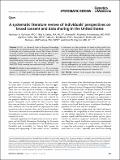| dc.identifier.citation | Garrison, Nanibaa' A., Nila A. Sathe, Armand H. Matheny Antommaria, Ingrid A. Holm, Saskia C. Sanderson, Maureen E. Smith, Melissa L. McPheeters, and Ellen W. Clayton. 2016. “A systematic literature review of individuals' perspectives on broad consent and data sharing in the United States.” Genetics in Medicine 18 (7): 663-671. doi:10.1038/gim.2015.138. http://dx.doi.org/10.1038/gim.2015.138. | en |
| dc.description.abstract | Purpose: In 2011, an Advanced Notice of Proposed Rulemaking proposed that de-identified human data and specimens be included in biobanks only if patients provide consent. The National Institutes of Health Genomic Data Sharing policy went into effect in 2015, requiring broad consent from almost all research participants. Genet Med 18 7, 663–671. Methods: We conducted a systematic literature review of attitudes toward biobanking, broad consent, and data sharing. Bibliographic databases included MEDLINE, Web of Science, EthxWeb, and GenETHX. Study screening was conducted using DistillerSR. Genet Med 18 7, 663–671. Results: The final 48 studies included surveys (n = 23), focus groups (n = 8), mixed methods (n = 14), interviews (n = 1), and consent form analyses (n = 2). Study quality was characterized as good (n = 19), fair (n = 27), and poor (n = 2). Although many participants objected, broad consent was often preferred over tiered or study-specific consent, particularly when broad consent was the only option, samples were de-identified, logistics of biobanks were communicated, and privacy was addressed. Willingness for data to be shared was high, but it was lower among individuals from under-represented minorities, individuals with privacy and confidentiality concerns, and when pharmaceutical companies had access to data. Genet Med 18 7, 663–671. Conclusions: Additional research is needed to understand factors affecting willingness to give broad consent for biobank research and data sharing in order to address concerns to enhance acceptability. Genet Med 18 7, 663–671. | en |


